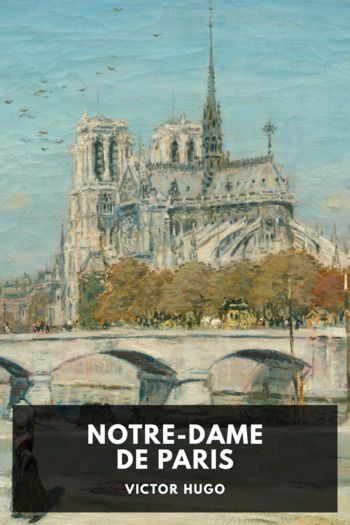Notre-Dame de Paris - Victor Hugo (diy ebook reader .txt) 📗

- Author: Victor Hugo
Book online «Notre-Dame de Paris - Victor Hugo (diy ebook reader .txt) 📗». Author Victor Hugo
The tumult around Notre-Dame was, in fact, increasing. They listened. Cries of victory were heard with tolerable distinctness. All at once, a hundred torches, the light of which glittered upon the helmets of men at arms, spread over the church at all heights, on the towers, on the galleries, on the flying buttresses. These torches seemed to be in search of something; and soon distant clamors reached the fugitives distinctly:—“The gypsy! the sorceress! death to the gypsy!”
The unhappy girl dropped her head upon her hands, and the unknown began to row furiously towards the shore. Meanwhile our philosopher reflected. He clasped the goat in his arms, and gently drew away from the gypsy, who pressed closer and closer to him, as though to the only asylum which remained to her.
It is certain that Gringoire was enduring cruel perplexity. He was thinking that the goat also, “according to existing law,” would be hung if recaptured; which would be a great pity, poor Djali! that he had thus two condemned creatures attached to him; that his companion asked no better than to take charge of the gypsy. A violent combat began between his thoughts, in which, like the Jupiter of the Iliad, he weighed in turn the gypsy and the goat; and he looked at them alternately with eyes moist with tears, saying between his teeth:
“But I cannot save you both!”
A shock informed them that the boat had reached the land at last. The uproar still filled the city. The unknown rose, approached the gypsy, and endeavored to take her arm to assist her to alight. She repulsed him and clung to the sleeve of Gringoire, who, in his turn, absorbed in the goat, almost repulsed her. Then she sprang alone from the boat. She was so troubled that she did not know what she did or whither she was going. Thus she remained for a moment, stunned, watching the water flow past; when she gradually returned to her senses, she found herself alone on the wharf with the unknown. It appears that Gringoire had taken advantage of the moment of debarcation to slip away with the goat into the block of houses of the Rue Grenier-sur-l’Eau.
The poor gypsy shivered when she beheld herself alone with this man. She tried to speak, to cry out, to call Gringoire; her tongue was dumb in her mouth, and no sound left her lips. All at once she felt the stranger’s hand on hers. It was a strong, cold hand. Her teeth chattered, she turned paler than the ray of moonlight which illuminated her. The man spoke not a word. He began to ascend towards the Place de Grève, holding her by the hand.
At that moment, she had a vague feeling that destiny is an irresistible force. She had no more resistance left in her, she allowed herself to be dragged along, running while he walked. At this spot the quay ascended. But it seemed to her as though she were descending a slope.
She gazed about her on all sides. Not a single passerby. The quay was absolutely deserted. She heard no sound, she felt no people moving save in the tumultuous and glowing city, from which she was separated only by an arm of the Seine, and whence her name reached her, mingled with cries of “Death!” The rest of Paris was spread around her in great blocks of shadows.
Meanwhile, the stranger continued to drag her along with the same silence and the same rapidity. She had no recollection of any of the places where she was walking. As she passed before a lighted window, she made an effort, drew up suddenly, and cried out, “Help!”
The bourgeois who was standing at the window opened it, appeared there in his shirt with his lamp, stared at the quay with a stupid air, uttered some words which she did not understand, and closed his shutter again. It was her last gleam of hope extinguished.
The man in black did not utter a syllable; he held her firmly, and set out again at a quicker pace. She no longer resisted, but followed him, completely broken.
From time to time she called together a little strength, and said, in a voice broken by the unevenness of the pavement and the breathlessness of their flight, “Who are you? Who are you?” He made no reply.
They arrived thus, still keeping along the quay, at a tolerably spacious square. It was the Grève. In the middle, a sort of black, erect cross was visible; it was the gallows. She recognized all this, and saw where she was.
The man halted, turned towards her and raised his cowl.
“Oh!” she stammered, almost petrified, “I knew well that it was he again!”
It was the priest. He looked like the ghost of himself; that is an effect of the moonlight, it seems as though one beheld only the spectres of things in that light.
“Listen!” he said to her; and she shuddered at the sound of that fatal voice which she had not heard for a long time. He continued speaking with those brief and panting jerks, which betoken deep internal convulsions. “Listen! we are here. I am going to speak to you. This is the Grève. This is an extreme point. Destiny gives us to one another. I am going to decide as to your life; you will decide as to my soul. Here is a place, here is a night beyond which one sees nothing. Then listen to me. I





Comments (0)